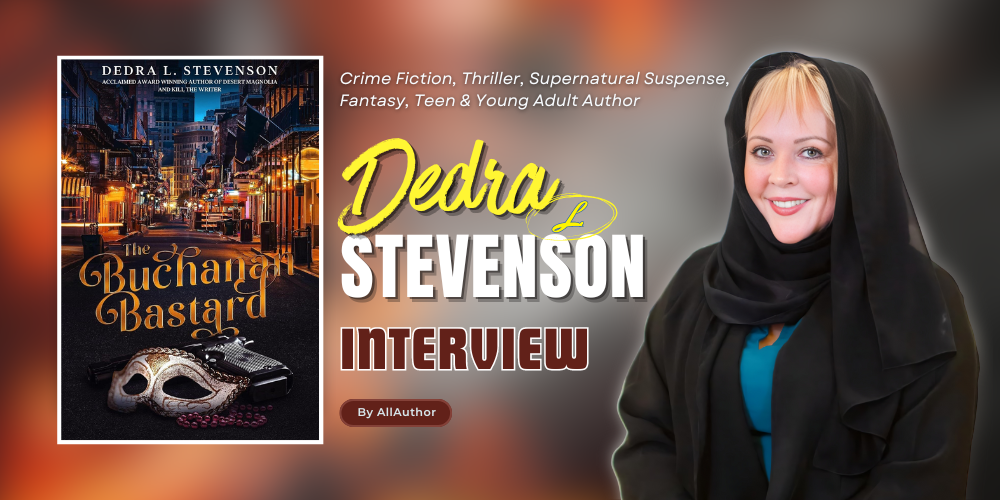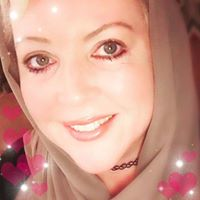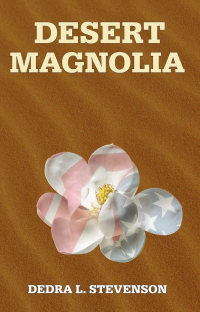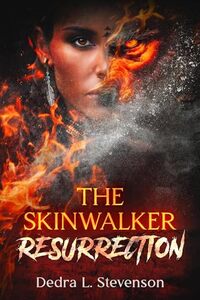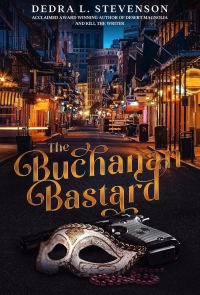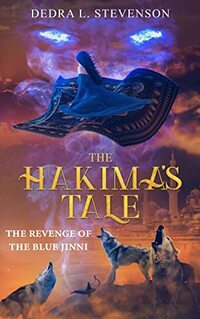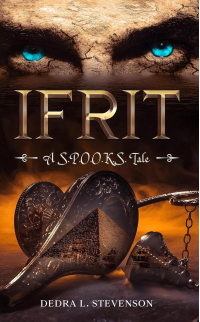Where were you born, and what was your childhood like?
I was born in a small town in Alabama to a very wealthy family. My childhood didn't reflect my position of privilege, however, as I went through one severe personal family tragedy after another, leaving me very traumatized, emotionally scarred, and painfully shy. I was a brainy kid with a mind that worked differently than others, so I was lonely and I had little in common with any of the other children, and as a result, I took solace in the library and books. Stories were my friends, and my imagination was my way out of my predicament whenever I needed it.
What inspired you to explore such a wide range of genres, from young adult fantasy fiction to crime, horror, and even cooking?
I started off with young adult fantasy fiction as a tribute to my childhood. I think it was a trilogy of wishes on my part, which is ironic considering it's mostly about genies or jinn. My main character in The Hakima's Tale, Phoenix, was largely based on my childhood nature, a shy young girl who knew she was destined to do something extraordinary, even if very few people could see it. Her parents were my dream parents, and her uncle was the mentor I had always wished for. I believe that any little girl out there who needs a little empowerment will benefit from reading The Hakima's Tale trilogy and will, perhaps, take solace in a story, as I did.
After the trilogy was done, I wanted to explore other genres as a personal challenge, to grow and adapt as a writer. While I enjoyed writing a horror novel, I felt particularly adept at writing crime thrillers. The Buchanan Bastard is, by leaps and bounds, my greatest writing achievement thus far. Set in the colorful and delightfully weird 1970s, my favorite decade, and in New Orleans, LA, one of my favorite cities. My husband and I honeymooned in New Orleans, and I've always believed that this city was magical and so diverse and stimulating. How could I resist using it as a setting for one of my novels?
The cookbook Breaking Bread Around the World was inspired by my home in the Middle East, UAE, one of the most international places I've ever seen. People from over 200 nationalities live in this country together, and as a foodie, I'm proud to report that I have tasted cuisine from almost all of them. Thinking about international cuisine gave me a thought. If we are able to sit down to a meal with people from all over the planet, we are more likely to see them as friends, so could international relations be greatly improved if we all took the chance to try food from other countries now and then? If you break bread with someone, you become friends, hence the title.
Your writing influences include Roald Dahl, Stephen King, Margaret Mitchell, and George R.R. Martin. How have these authors shaped your writing style and storytelling approach?
Yes, definitely. The Buchanan Bastard is written in Game of Thrones style, as I learned from reading George R.R. Martin's amazing novels. His style of switching character points of view with each chapter really puts the reader in a scene, making them feel as though they are experiencing the action as well.
Roald Dahl helped me as a child. He helped me see the world in new ways and ask relevant questions. After all, he made me imagine a world where the river is made of chocolate and the trees are made of candy. It's a great way to ask, "what if?" I think I used this ideology as I wrote The Hakima's Tale novels. I'm also using it as I write the S.P.O.O.K.S. series books.
As a Southern woman, I grew up with Margaret Mitchell and her greatest heroine, Scarlet O'Hara. Scarlet, like me, was born into privilege but found herself at rock bottom as a result of severe tragedy. Her strength and determination, coupled with her charming nature, helped her carve her own success and persevere. She's a hero and one that I drew inspiration from. I learned to appreciate the power of a well-written protagonist from Margaret Mitchell.
As for Stephen King, well......I learned that even something innocuous can be terrifying in a story if it's written in Stephen King style. A car, a field of tall grass, a shy nerd, or a pet? One would have never imagined these things to be a source of horror, but Mr. King knows how to build tension, feeding us breadcrumbs of uneasiness all along until we shake in our boots. I learned scene building from reading his work, but I have a long way to go to be a master of this technique as he is.
Given your background in producing films and podcasts, how does your experience in these mediums influence your approach to storytelling in written form?
That's a great question. Working with screenplays and films helped me write stories that move at a faster pace so that the reader doesn't become bored with them. Action scenes, comedic scenes, and other high-emotion scenes are well-timed and mixed between moments that allow the reader/viewer to catch one's breath and build tension for the next crucial moment.
In your works, you often feature strong female leads. What draws you to create such characters, and how do you approach developing their personalities and stories?
I'm all about empowering women, and yes, this is why I focus on female leads and stories that honor the profound inner strength found in most women. In medicine, it's widely known that a woman's pain threshold is 9 times more than a man's. What society doesn't tell us often enough, however, is that a woman's inner strength can be herculean if she fully taps into it. Again, going back to the strong Southern woman stereotype, on the surface, you may see a sweet mom type that bakes cookies for the kids and meets other ladies for tea and community outreach programs. If you look harder, you see that she's the glue that holds everything and everyone together, as well as the source of everyone's courage, as she's the one who's carefully drawn it out of every member of her circle. My books reflect my idea that there's not much that a woman can't do if she's aware of her strengths.
You mentioned that you try to "teach" something in each of your works. Could you elaborate on this and share an example from one of your books?
I do try to teach something with each novel, and if you look closely at my stories, you'll see the "veins", central themes of family, inner strength, perseverance, faith in God, forgiveness, standing up for what you believe in, and learning to love yourself in spite of your flaws. An example would be Jack in "The Buchanan Bastard." Jack's son was murdered, and by a strange turn of events, he managed to find forgiveness for the killer, someone he was also connected with. (If I mention any more, I'll give away a major plot point). Also, Daniella, my protagonist in Desert Magnolia...She managed to help her cousin get out of a difficult situation by bravely facing many demons from her past, and by doing so, she paved a much stronger path for her own family.
Tell us about your award-winning short documentary. What was the inspiration behind it, and how has the experience of directing and producing a documentary informed your creative process in other mediums?
My short documentary was inspired by my son, Ibrahim, who happens to be Autistic. I wanted the world to be more aware of the challenges of caring for an adult with Autism, and I'm proud to say that the film inspired new legislation in the UAE for the incorporation of a golden standard of diagnoses and treatment of kids with Autism. It's a wonderful thing when one experiences the power of film in such a way. Making the film was also a wonderful experience for my family and Ibrahim's caregivers at the time, who were both making a difference in his life. Autism Awareness remains a cause that I'm passionate about. As for how the film influenced my creative process in other mediums, I became passionate about script writing and went on to win 15 awards worldwide for Best Short Screenplay for my scripts entitled Kill the Writer and Kill the Millennial. I hope to get a limited series made at some point for this "Kill the..." series.
With your inclination to make readers "feel the environment and experience the characters deeply," how do you create immersive worlds and relatable characters in your writing?
I simply imagine my characters as real people, people that I know. I also mix a little inspiration from "actual" people in my life. I ask myself, "What would this character say about family? Or love? What does this character like to do for fun? Do they have any catchphrases? Anything that makes them more "3D". The environment should be brought into focus in a visceral way by describing the sights, sounds, smells, etc.... Also, memorable action.
How do you balance the different genres you write in, and do you find that your creative process varies significantly between genres?
When I'm writing a book, my creative process varies slightly, depending on the story. Crime stories, for example, require more details, like weapons, for example. If your story is in the 1970s and you mention a weapon that wasn't invented at that time, it's a huge mistake that will be noticed. Fantasy fiction allows more imagination, especially if your setting is in an imaginary world or in the future or another planet if you're into science fiction. Still, research should be carefully performed to make it all seem plausible. The reader wants to be able to suspend reality, after all.
Tell us about the intersection of your writing and cooking. How did you decide to incorporate cooking into your creative pursuits, and what can readers expect from this unique blend in your work?
I'm lucky enough to have traveled a little bit, so when I decided to craft a cookbook around my favorite dishes from 30 countries, I included many places I've "actually" visited. I even included real pictures of myself in these places on some pages, as well as some anecdotes from my travels, so it's not only a cookbook but a bit of a travel guide as well! Breaking Bread Around the World is designed to give us some further appreciation for the world and cultures that you may not have considered before. When you break bread with a stranger, they become your friend, so I combined my love of food and cooking with a desire to see the world become a friendlier place, not so ethnocentric.
As a writer who enjoys encouraging other writers, what advice do you have for aspiring authors looking to make their mark in the literary world?
I encourage writers to take their time and write stories that feel familiar to them. For example, since I'm a Southern lady, I feel very comfortable writing stories based in places like Alabama, Georgia, etc... I know the dialect, the mannerisms, and what would feel plausible in a cultural setting like this. Also, craft characters that excite you. After all, if it's boring to you, it will definitely be boring to others. Above all, be patient and keep working at it. Ballerinas didn't learn how to dance on their toes in one day. As with any craft, it takes practice and discipline.
Can you share a bit about the upcoming children's series?
Little Loud Beatrice and the Magic Painting is only the first book in a series of children's stories called the Magic Carpet Series. These books are for children aged 6-9 and are all about thinking positively and appreciating one's imagination and its tremendous potential. I'm very excited for these books to be out there at full strength, but it will take some time to tweak this project.
Your social media presence seems important to you. How do you engage with your readers and fellow writers online, and what role does social media play in your overall writing and promotional strategy?
In today's world, social media is crucial, and to be honest, I haven't figured it all out. In fact, I have a lot to learn, but I'm trying. Posting on Instagram, TikTok, and Facebook are my cornerstones of marketing at the moment, and if I am running a sale on an eBook, for example, I use a countdown to save. Events are also better attended if I post about them. I've also tried going live on Instagram and Twitter. That's a great way to connect with people in real-time.
How long have you been associated with AllAuthor? How has your experience been?
I have LOVED being part of AllAuthor. I love the banners that have been made for me each week, and it's helped my social media posts so much! I also love the tweets that have been posted on my behalf. So well written and thoughtful, and of course, there's this interview. That's what I call good support.
